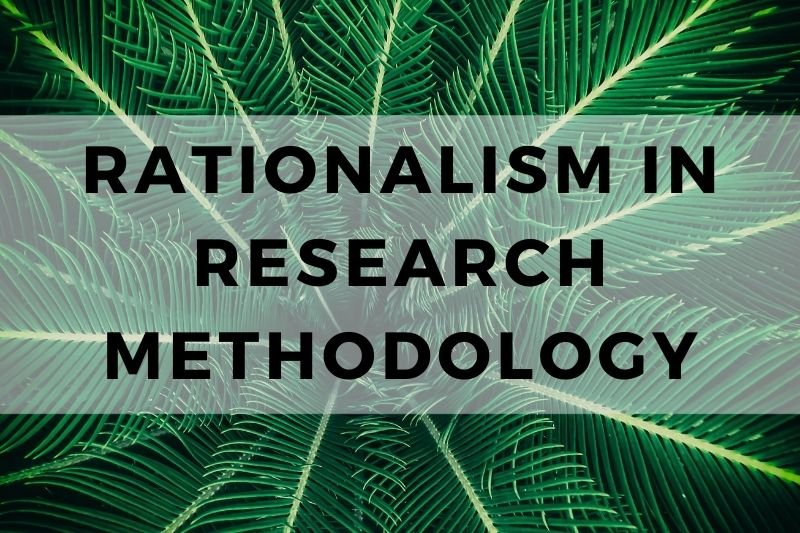
Rationalism in Research Methodology emphasizes the importance of reason and logic as the foundation for knowledge. It argues that truth can be derived through intellectual processes rather than sensory experience. In research, this philosophy shapes how we approach problems, design studies, and interpret data.
Rationalism encourages clarity, systematic thinking, and objective analysis, all of which influence the design and execution of various research methodologies. Understanding this influence is essential for researchers striving to produce rigorous, credible results.
Understanding Rationalism
Rationalism is a philosophical view that prioritizes reason over sensory experience in the pursuit of knowledge. It holds that certain truths can be known through intellect alone, independent of external influences. This contrasts with empiricism, which argues that knowledge is primarily derived from sensory experience.
In research, rationalism encourages a structured approach where hypotheses, theories, and conclusions are based on logical reasoning and coherence rather than purely observational data. The application of rationalism in research methodologies ensures that the findings are grounded in sound reasoning and not just empirical observations. This intellectual foundation is crucial for developing reliable theories and frameworks that drive scientific progress.
How Rationalism Influences Research Methodology
#1. Qualitative Research
Rationalism in qualitative research emphasizes logical analysis in understanding human experiences and behaviors. Researchers apply structured thinking to interpret meanings, patterns, and relationships within data, rather than relying solely on subjective observations. This ensures that conclusions drawn from qualitative studies are consistent, coherent, and intellectually grounded. By focusing on reasoning, rationalism helps clarify interpretations and provides a framework to avoid bias, thus enhancing the validity and credibility of the findings in qualitative research.
#2. Quantitative Research
In quantitative research, rationalism influences the development of hypotheses and theoretical frameworks, ensuring that data analysis is based on sound reasoning. Researchers derive conclusions from numerical data through logical processes, allowing for objective interpretation. The use of rational principles helps in designing experiments, creating measurement instruments, and analyzing results to ensure accuracy and consistency. This methodical approach is key in ensuring that findings are not skewed by emotional or subjective factors, but instead reflect empirical truths.
#3. Mixed Methods Research
Rationalism shapes mixed methods research by guiding the integration of both qualitative and quantitative data. Researchers use reasoned strategies to merge these two approaches, ensuring that the strengths of each complement the other. Logical reasoning helps in identifying how qualitative insights and quantitative results can be synthesized into a coherent understanding of a research problem. Rationalism provides the intellectual framework for addressing complex research questions and ensures that conclusions are based on systematic reasoning and not fragmented data.
#4. Action Research
In action research, rationalism emphasizes a systematic approach to solving real-world problems through iterative cycles of planning, acting, observing, and reflecting. Researchers rely on logical reasoning to analyze the effectiveness of interventions and determine areas for improvement. Rationalism ensures that the findings are grounded in coherent reasoning, allowing researchers to make informed decisions based on evidence. This methodology aims to bridge theory and practice, and rationalism ensures that the application of research results is guided by clear, rational thought.
#5. Experimental Research
Rationalism in experimental research focuses on designing controlled experiments with logical hypotheses and systematic analysis. Researchers apply reason to predict outcomes and ensure that variables are manipulated and controlled in a way that accurately tests the hypothesis. The rational framework guarantees that experimental results are interpreted in a clear, objective manner, minimizing the influence of extraneous factors. This helps establish cause-and-effect relationships through precise and logical reasoning, providing valid and reliable evidence.
#6. Survey Research
Rationalism guides survey research by ensuring that questionnaires and survey instruments are based on logically sound principles. Researchers design surveys with well-thought-out questions that align with the research objectives and are free from bias. The rational approach helps in interpreting survey results objectively, avoiding subjective distortions. Researchers use logical reasoning to analyze patterns and trends in responses, ensuring that the findings accurately reflect the population being studied. This structured methodology enhances the validity of survey-based conclusions.
#7. Longitudinal Research
In longitudinal research, rationalism influences the design of studies that track changes over time. Researchers apply logical reasoning to determine which variables to measure, how to structure data collection, and how to interpret long-term trends. This systematic approach allows for the identification of causal relationships between variables, ensuring that the study’s conclusions are based on sound, reasoned analysis. Rationalism helps maintain objectivity by guiding the evaluation of data without overreliance on subjective interpretations.
#8. Cross-Sectional Research
Rationalism shapes cross-sectional research by emphasizing logical reasoning in the analysis of data collected at a single point in time. Researchers ensure that the study design is based on clear theoretical foundations and that variables are measured accurately. Rationalism helps in drawing meaningful comparisons between different groups or variables, ensuring that conclusions are drawn logically from the data. By applying rational thought to data interpretation, researchers can avoid biases that might distort the findings.
#9. Historical Research
In historical research, rationalism ensures that the interpretation of past events is grounded in logic and evidence. Researchers apply reasoned analysis to primary sources, seeking to construct coherent narratives and explanations of historical phenomena. Rationalism helps in distinguishing between plausible and implausible interpretations, ensuring that historical conclusions are based on well-founded reasoning rather than subjective opinion. This approach enhances the credibility of historical research by ensuring that the analysis is objective, logical, and free from bias.
#10. Exploratory Research
Rationalism influences exploratory research by providing a logical framework for investigating new or poorly understood phenomena. Researchers apply reason to design studies that systematically explore research questions, ensuring that insights are derived from logical analysis rather than random or subjective observations. Rationalism ensures that exploratory research is structured, helping researchers refine their hypotheses and theories based on coherent, reasoned observations. This intellectual discipline allows for the development of new ideas that are grounded in sound reasoning.
#11. Descriptive Research
Rationalism plays a key role in descriptive research by emphasizing the logical organization and presentation of data. Researchers rely on reasoned methods to collect, analyze, and present data, ensuring that the findings accurately reflect the phenomena being studied. Rationalism helps eliminate subjective biases and ensures that the research design is based on clear principles. By focusing on logical reasoning, researchers can ensure that the descriptions provided are consistent, accurate, and supported by empirical data.
#12. Correlational Research
In correlational research, rationalism guides the identification and interpretation of relationships between variables. Researchers use logical reasoning to analyze how variables are related, ensuring that the conclusions drawn are based on evidence rather than assumption. Rationalism helps in constructing hypotheses that are testable and in interpreting correlation results with clarity. This structured approach ensures that the research findings are valid, avoiding common pitfalls such as misinterpreting correlation as causation.
#13. Theoretical Research
Rationalism shapes theoretical research by encouraging the development of models and frameworks grounded in logic. Researchers apply reason to generate theories that explain phenomena, ensuring that the conclusions are coherent and consistent with existing knowledge. Rationalism helps in developing theoretical frameworks that are logically sound and capable of guiding future research. By emphasizing reason and intellectual rigor, rationalism ensures that theoretical research contributes meaningfully to advancing knowledge in a particular field.
#14. Computational Research
In computational research, rationalism influences the design of algorithms, models, and simulations. Researchers apply logical reasoning to create tools that can accurately represent complex systems and predict outcomes. Rationalism ensures that the computational methods used are grounded in sound theoretical principles, producing reliable results. This logical framework is crucial for interpreting the vast amounts of data generated in computational research, ensuring that conclusions are derived from methodical, objective analysis rather than intuition or assumption.
#15. Grounded Theory Research
Rationalism shapes grounded theory research by ensuring that the process of theory development is systematic and logically structured. Researchers rely on reasoned analysis to identify patterns within qualitative data and construct theories that are both grounded in evidence and logically coherent. Rationalism helps ensure that the theories developed are not arbitrary but are supported by clear, intellectual reasoning, providing a solid foundation for further research and theory development.
#16. Content Analysis
In content analysis, rationalism influences the systematic coding and interpretation of qualitative data. Researchers apply logical reasoning to categorize content, ensuring that themes and patterns are identified in a structured and objective manner. Rationalism guides the analytical process, helping researchers avoid biases and ensuring that conclusions are based on reasoned analysis. This approach allows researchers to derive meaningful insights from textual, visual, or other forms of content with clarity and precision.
#17. Case Study Research
Rationalism impacts case study research by ensuring that each case is analyzed through a logical, structured approach. Researchers use reasoned methods to identify key issues, gather evidence, and draw conclusions. Rationalism ensures that the case study findings are based on objective, systematic analysis rather than personal bias. By applying rational thinking, researchers ensure that the insights derived from case studies are coherent, reliable, and relevant to the broader research questions being addressed.
Conclusion
Rationalism in research methodology serves as a foundation for ensuring that studies are grounded in logical reasoning and objective analysis. Whether in qualitative, quantitative, or mixed methods research, rationalism guides researchers to approach problems systematically, minimizing bias and maximizing the reliability of findings.
By emphasizing reason over sensory experience, it fosters clearer, more coherent research designs and interpretations. Ultimately, rationalism enhances the integrity of the research process, helping to produce credible, valid results that contribute meaningfully to the body of knowledge.
